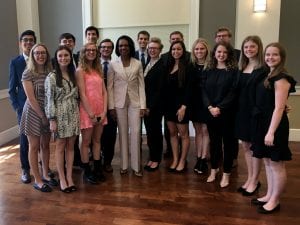
Former Secretary of State Condoleezza Rice spoke at the SMU Tower Center April 18 on a panel with former U.S. Ambassador to Portugal Thomas Stephenson. Senior Fellow Jeffrey A. Engel, director of the Center for Presidential History and moderator of the talk, opened the discussion with memories of Barbara Bush, who passed away the night before.
Remembering Barbara Bush
“She was a force,” Rice said. “She is someone who will always be remembered as a national treasure.”
Rice remembered a time in Moscow when Barbara Bush was scheduled to give a joint speech with Mikhail Gorbachev’s wife, Raisa Gorbacheva. Raisa kept pushing back the time of the meeting and instead of reacting, Rice said Mrs. Bush kept her cool and agreed to all of Raisa’s last minute changes. “She took all the venom out,” Rice said. She remembered thinking it was great diplomacy.
“Barbara Bush was someone who did things her own way,” Stephenson added.
Life at the White House
Rice’s first gig at the White House was as a Soviet specialist on President George H.W. Bush’s National Security Council at the end of the Cold War. In response to Engel’s question of what ran counter to her expectations she said everything surprised her because everything was happening so fast. She couldn’t write strategies fast enough to keep up with Mikhail Gorbachev’s sudden retreat from eastern Europe.
Rice remembers her first time in the Oval Office. “I was there to take notes,” she said, “but I started looking around.” She remembers feeling overwhelmed at seeing the Resolute Desk and the portrait hanging of George Washington–so overwhelmed, in fact, she forgot to take notes during the meeting. When she met President Trump last March, she told him this story. “This Oval Office is a special place,” she told him. “In some ways it’s your most powerful tool–inviting people to meet here.” Even Russian President Vladimir Putin found the office awe-inspiring on his first visit. “It’s beautiful,” she recalled him saying.
The U.S. and North Korea
Engel shifted the conversation to North Korea. Mike Pompeo, director of the CIA and Trump’s pick as the next secretary of state, met with Kim Jong-un earlier this month. It was the first face-to-face meeting of an American high-level official with the Kim regime since Madeleine Albright met with Kim Jong-il in 2000.
Rice said at first she was confused as to why Trump would send Pompeo to meet with a political leader who has been threatening the US with nuclear war. But then she thought, “well, nothing else has worked.” Her only concern was that the Trump administration wouldn’t plan for negotiations and wouldn’t understand the nuances of the relationship. The fact that Pompeo met with Kim before Trump did makes her feel that’s not the case.
“It looks like they’re doing it the right way,” Rice said. “This is a place the administration has done very well.”
The pressure system carefully crafted by former Secretary of State Rex Tillerson pushed the regime to resort to an “Olympics charm offensive,” she said. Expelling North Korean workers from several countries took away an important source of currency for the regime.
Where are we on Russia?
Rice told Engel she thinks the U.S. and Russia are in a new, and in some ways more dangerous, Cold War. Putin’s mission is to avenge Russia of its embarrassing loss in the Cold War. He decided that Russia needs an enemy and that that enemy will be the United States, she said. Despite Putin’s aggressive posturing, Rice still insists the U.S. has to find spaces to cooperate with Russia — the first of which could be North Korea. She also more surprisingly added we could cooperate with Russia on Syria.
“We missed the chance to out Assad,” she said. Russia and Iran have already filled the vacuum in Syria left by US inaction, and now the humanitarian crisis is too horrifying to not pursue a peace deal with Syrian President Bashar al-Assad through Russia.
Advice for young women
HCM Tower Scholar Destiny Rose Murphy, ’19, asked Rice what advice she had for women who want to pursue a career in policy, but don’t see a place for themselves in the current administration. Rice’s message: “Prepare yourself.” She closed the talk with three rules she was raised with from her mother:
- You have to be twice as good as everyone else. The confidence you gain from working hard enough to be twice as good will get you to where you want to be.
- There are no victims. Being a victim gives control to someone else. “Don’t let somebody else’s prejudice be your problem,” Rice said. Her father told her: “If someone doesn’t want to sit next to you because you’re black, that’s fine–as long as they move. Not you.”
- This is all easier with good mentors–and they don’t have to look like you. Rice said that as a Soviet specialist in the late ’80s all of her mentors were older white men.